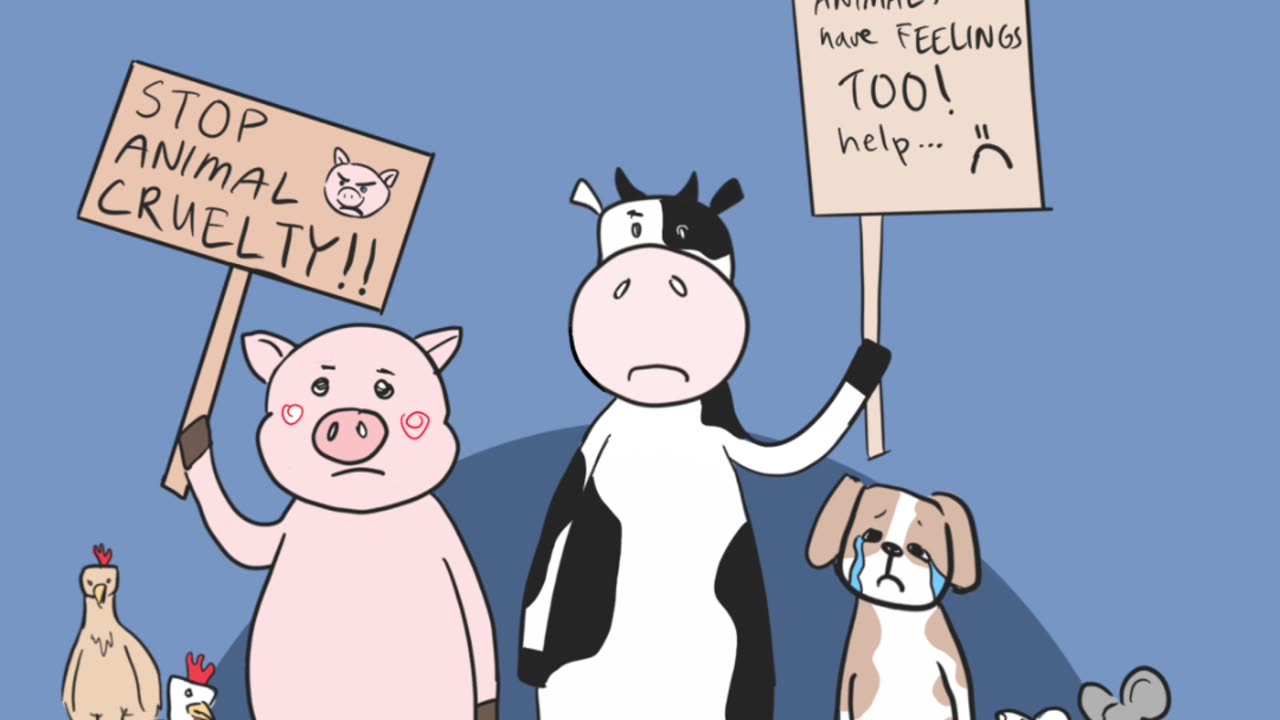Premium Only Content

Do Animals Think Deep Thoughts… or Just Plot Snacks? 🧠🐾 | Consciousness vs. Projection
#AnimalConsciousness #NeuroscienceVsPhilosophy #DoAnimalsThink #MindOfADog #OctopusIQ #FunnyScience #DeepThoughtsOrSnacks #PhilosophyWithFur #BrainyBeasts #SarcasticScience
Let’s start with the obvious: humans are spectacular at believing whatever flatters our ego. We look at a dog staring into space and think, “Awww, he’s contemplating the meaning of life,” when he’s probably remembering the exact location of the neighbor’s squirrel buffet. Still, that comfortable human habit, projecting our inner monologue onto furry, feathered, or scaly companions, forces a genuinely interesting question: are we anthropomorphizing because animals are secretly little philosophers in fur, or because we desperately need company in the cosmic void?
Neuroscience barges into the argument like a lab coat-wearing bouncer, waving PET scans and neural correlates. Show me the brain activity, it says, and I’ll tell you whether there’s pain, pleasure, or that baffling state we call “I.” Mammals have brain structures eerily similar to ours; birds have alternative wiring that gets the job done; octopuses, bless their alien brains, solve puzzles like sleepy professors. If consciousness requires a nervous system that reacts, integrates, and modifies behavior based on internal states, many animals check the boxes. If, however, consciousness is the premium subscription that includes self-reflection, guilt, and an appreciation for indie films, then the receipts are thinner.
Philosophy, meanwhile, smiles politely and asks for a cup of tea before offering a paradox: what do we even mean by “consciousness”? Is it mere awareness of stimuli, the subjective flavor of experience (that delicious qualia), or a metacognitive spotlight that says, “I think, therefore I am… worried about my taxes”? Behaviorists hand us helpful checklists, problem-solving, flexible behavior, empathy-like responses, and philosophers scribble “subjectivity?” in the margins. The slippery thing is that subjective experience is, by definition, only directly accessible to the experiencer, making it the least cooperative guest at the epistemic party.
Practical ethics crashes the party with sharper shoes: whether or not animals have human-grade introspection, treating beings that can feel suffering like disposable furniture is morally dubious. Here neuroscience and philosophy converge into a pragmatic duet, if an organism exhibits pain responses, avoidance learning, and social distress, pretending it’s a sentient Roomba is either willful ignorance or an excellent poker face. So even if we can’t empirically prove the inner monologue of a goldfish, the compassionate and scientifically cautious move is to act as if those little creatures have experiences worth considering, unless you enjoy the company of angry philosophers and outraged veterinarians.
In the end, the debate is less about who gets the label “conscious” and more about how our uncertainty should shape behavior. Arguing about who’s philosophically awake is fun, better than a quiz show and less hazardous than cliff-diving, but it shouldn’t paralyze us into moral apathy. Whether animals possess an interior monologue identical to ours, a different brand of subjectivity, or something beyond our metaphors, the sensible default is humility: recognize complex minds where evidence suggests them, adjust our actions accordingly, and stop assuming a staring dog is judging our taste in music, though, granted, that judgment might be accurate.
-
 21:40
21:40
Bitcoin Policy Institute
6 hours agoCongressman Warren Davidson Unveils the “Bitcoin for America Act” | Spotlight Series #1
13.4K -
 LIVE
LIVE
LFA TV
20 hours agoLIVE & BREAKING NEWS! | THURSDAY 11/20/25
1,030 watching -
 LIVE
LIVE
freecastle
7 hours agoTAKE UP YOUR CROSS- Let your eyes LOOK directly FORWARD, and your gaze be STRAIGHT before YOU!
155 watching -
 1:25:51
1:25:51
DeVory Darkins
5 hours agoDemocrats caught in corruption scheme as JD Vance issues MAJOR UPDATE
143K70 -
 1:48:48
1:48:48
MattMorseTV
6 hours ago $38.36 earned🔴Sedition Charges INBOUND.🔴WH Press Conference.🔴
58.7K161 -
 9:06
9:06
Jamesons Travels
21 hours ago $4.46 earnedMilitary Veterans in Congress Tell Troops to Refuse Trump's Orders
31.9K46 -
 1:42:47
1:42:47
The Bold Lib
3 hours agoBOLDCHAT: Unemployment | AI | Birth Rates w/ANGELA BELCAMINO
22.3K1 -
 20:34
20:34
ArynneWexler
8 hours agoNew Poll: Women Are Done With America | NN8
25.4K41 -
 59:30
59:30
The White House
6 hours agoPress Secretary Karoline Leavitt Briefs Members of the Media, Nov. 20, 2025
62.1K28 -
 2:06:37
2:06:37
Steven Crowder
8 hours agoJasmine Crockett's Epstein Idiocy & the Absolute State of the Democrat Party
603K402